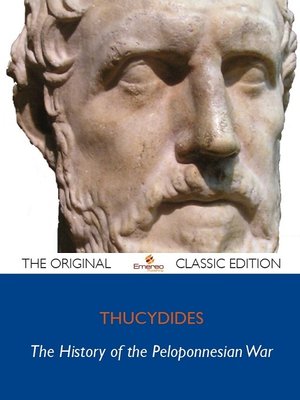The History of the Peloponnesian War - The Original Classic Edition
ebook

Sign up to save your library
With an OverDrive account, you can save your favorite libraries for at-a-glance information about availability. Find out more about OverDrive accounts.
Find this title in Libby, the library reading app by OverDrive.



Search for a digital library with this title
Title found at these libraries:
| Library Name | Distance |
|---|---|
| Loading... |
"History of the Peloponnesian War" is, superficially, merely an account of a war that happened centuries ago, the Peloponnesian War, between Athenas and Sparta. Of course, you might think that the subject is trivial to you. After all, how important can a book like that be?. Well, if you were to think that, you would be enormously mistaken.
To start with, this book is a milestone you need to be aware of. Thucydides, its author, is very possibly the first modern historian. He tried to explain the causes of the Peloponnesian War, without reducing its complexity by saying that the gods had motivated it. Thucydides doesn't follow the easy path; instead, he searches those causes in human nature, and in power. He doesn't weave tales, but tries to write History.
It is rather astonishing how objective this Athenian was when he analyzed the war, and all that happened immediately before it. He examines methodically many events, paying special attention to facts. The author also gives his opinion from time to time, but he doesn't judge whether an action is good or evil: he merely shows that those that have power can use it as they see fit. Due to that, Thucydides is called by many the first realist theoretician. I was especially taken aback by how well he expresses his ideas regarding the fact that "power makes right" in the Melian debate. I don't agree with him, but I cannot deny that he makes a powerful case, and that his point of view is shared nowadays by many noteworthy thinkers.
It is important to point out that in "History of the Peloponnesian War" you will find a painstaking account of many things that actually happened, but also some speeches that weren't made by the actors, but could have been made by them. To explain that more clearly: Thucydides wrote some political dialogues and monologues that allow us to understand some aspects of the conflict (and many of his ideas) better. The introduction to this edition also highlights that the author sometimes made up some of the speeches (from the data he had), and was present when others were pronounced. My favorite speech is the one made by Pericles, in honor of the men who died during the war. In that discourse, he explains why those men fought and died to defend Athens, and what Athens meant not only for Athenians but also for Greece.
This book isn't easy to read, but it is well-worth the effort. The translation is quite good, so that will make your task a little easier. If you don't feel like reading this book all at once, try to read it little by little. The results will be the same, but you won't feel dismayed by the need of finishing it immediately.
Also, if you can, try to relate some of Thucydides themes to our modern world. You will find that easier that you might think, and it will make you pay more attention to what you are reading. You are likely to be very surprised, for example, at how similar some of nowaday's justifications for taking advantage of power without paying attention to justice are to those that Thucydides already made a long time ago. On the whole, I highly recommend this book.







